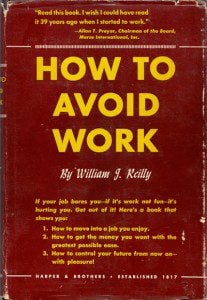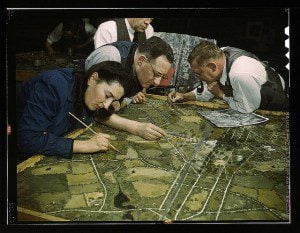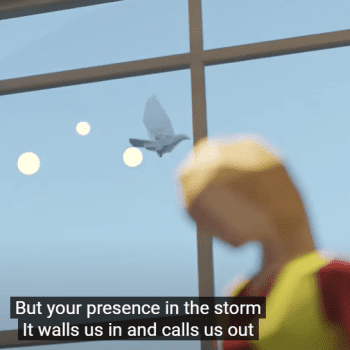 This channel’s been home recently to some musings on the “Do What You Love” school of vocation advice: Jeff Haanen and J. B. Wood have reminded us that God may sometimes want us in places we don’t love, that failure to be in a place where we can do where we love does not mean we have failed in our faithfulness, and that a choice for stability over dream-chasing is not an unChristian choice.
This channel’s been home recently to some musings on the “Do What You Love” school of vocation advice: Jeff Haanen and J. B. Wood have reminded us that God may sometimes want us in places we don’t love, that failure to be in a place where we can do where we love does not mean we have failed in our faithfulness, and that a choice for stability over dream-chasing is not an unChristian choice.
I thought of all that when I ran into a feature on this 1949 book on the eclectic site Brain Pickings. Here’s a sample quote from the book:
Actually, there is only one way in this world to achieve true happiness, and that is to express yourself with all your skill and enthusiasm in a career that appeals to you more than any other. In such a career, you feel a sense of purpose, a sense of achievement. You feel you are making a contribution. It is not work.
[…]
To my mind, the world would be a much pleasanter and more civilized place to live in, if everyone resolved to pursue whatever is closest to his heart’s desire. We would be more creative and our productivity would be vastly increased.
Altogether too much emphasis, I think, is being placed on what we ought to do, rather than what we want to do.
…which the Brain Pickings author, Maria Popova, later pairs with a quote from Neil Gaiman:
The greatest satisfaction you can obtain from life is your pleasure in producing, in your own individual way, something of value to your fellowmen. That is creative living!
When we consider that each of us has only one life to live, isn’t it rather tragic to find men and women, with brains capable of comprehending the stars and the planets, talking about the weather; men and women, with hands capable of creating works of art, using those hands only for routine tasks; men and women, capable of independent thought, using their minds as a bowling-alley for popular ideas; men and women, capable of greatness, wallowing in mediocrity; men and women, capable of self-expression, slowly dying a mental death while they babble the confused monotone of the mob?
 In another excerpt from the book, William Kelly divides work into four parts:
In another excerpt from the book, William Kelly divides work into four parts:
In every business, art, trade or profession, there are four major jobs to be done:
-
Creative — inventing, discovering, or developing new ideas
-
Administrative — making plans and policies for the conduct and supervision of the entire business or project
-
Executive — directing the work of others in actually carrying out plans and policies in one or more departments or sections
-
Line — performing some individual routine task involving no responsibility for the work of others
But he spends most of his time telling his readers how to figure out if they fit in the first three. (What if you are cut out to be–or called to be–a line worker?)
Nevertheless, there’s some interesting tips and thoughts if you hop over to the Brain Pickings page on how to cultivate creativity and an entrepreneurial spirit (and an acknowledgement from Maria Popova that the career landscape might be a bit different today.) Plus another good article on a book about the meaning of life.
What do you think? Is doing what you love ever appropriate as a vocational guide? Is it a good guide but a bad master?
Images: Brain Pickings, Library of Congress.












